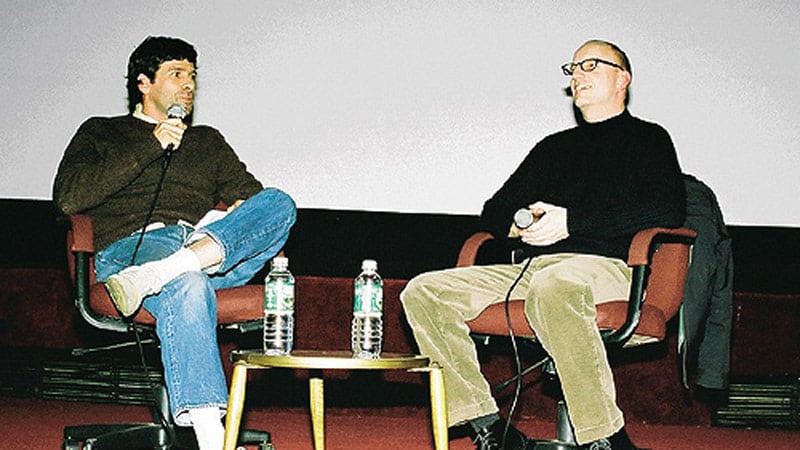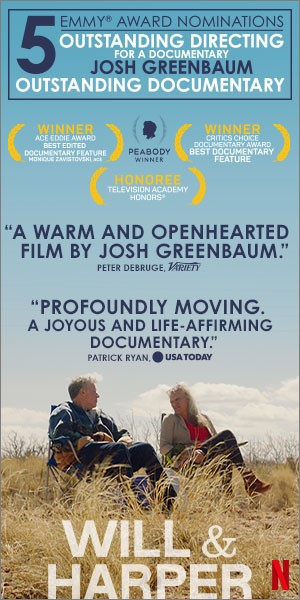Oscar-winning director and DGA First Vice President Steven Soderbergh discussed his latest film, Solaris, with director Gary Winick at the DGA Theatre in New York on November 20 before an audience of DGA members. Winick, who was named best director of a theatrical feature at last year's Sundance Film Festival for Tadpole, focused his questions on the personal aspects of the film and making an art film for a major studio.
Though the film, a remake of sorts of the 1972 movie by Russian director Andrei Tarkovsky, can be categorized as science fiction, its story of romance and lost love places it in a timeless environment. In fact, Soderbergh told Winick that he de-emphasized technology because, as he said, "I'm not that interested in technology."
Winick asked Soderbergh how he became involved with James Cameron on Solaris. Actually, 20th Century Fox wanted Soderbergh to direct a science fiction film, even before Traffic was released. Soderbergh, the son of a college professor, admired the cerebral and metaphysical science fiction novels of Stanislaw Lem, particularly Solaris.
Cameron, who had spent five years clearing the rights to both the novel and the film, knew that Soderbergh could realize the psychological and metaphysical qualities of the story rather than just the special effects aspect of the project. Soderbergh and Cameron meshed smoothly as director and producer, though Soderbergh wryly added, "It was a shotgun marriage, honestly, because he had something I wanted. I found him to be a great resource. He's an extremely bright guy. He knows narrative backward and forward, which is really helpful to me because it's not really my strong suit as a writer. We talked a lot. We talked all through the script writing. We talked all through post-production. He was a really terrific sounding board." Cameron also allowed Soderbergh to depart from the original narrative to add his own dimension and ideas to the mix.
Soderbergh told Winick that his working relationship with George Clooney was equally harmonious. They had earlier worked together on a number of films including Out of Sight and Ocean's Eleven. Clooney asked to be cast as the psychologist sent to investigate a mutiny on a space exploration at the farthest reaches of the universe. Instead, he confronts his own unresolved past. Years before his wife had committed suicide because of their irreconcilable conflicts. Because he cannot find closure, he is condemned to resurrect her body and spirit in space.
Though Soderbergh was the cinematographer, he worked closely with production designer Philip Messina. A blue and green color scheme was used, but gray was mixed in to give a monochromatic tone to the film. As the film progressed in outer space, Soderbergh told Winick, "the lenses got longer and longer," to emphasize the abstract quality of the film and express the emotional torment of Clooney's character. Conversely, the flashback scenes on earth were photographed in intimate, personal terms with no abstraction.
Soderbergh acknowledges the influence of Joseph Von Sternberg, a director he admires and whose films, such as Underworld (1927) and The Scarlet Empress (1934) he studied while he was preparing Solaris. With "The Scarlet Empress — you look at the movie again and there are very few repeated shots. He really links one shot to the next and one sequence to the next. Really extraordinary. I always responded to his work."
Soderbergh admitted having an emotional linkage to films of the silent era because of his own predilection to translate scenario words into visual terms. Like Von Sternberg, Soderbergh is less interested in denouement and exposition than in experimental and avant-garde visual principles. There are perhaps two versions of Solaris by Soderbergh. The original version he made, he felt was too avant-garde for the average viewer. He recut it to make it more accessible, but he hopes to release the original version one day on DVD.
He also told Winick that when he read the original reviews of Stanley Kubrick's 2001: A Space Odyssey, a sizeable number were mixed and negative, and yet that film is now acknowledged as a cornerstone of science fiction.





